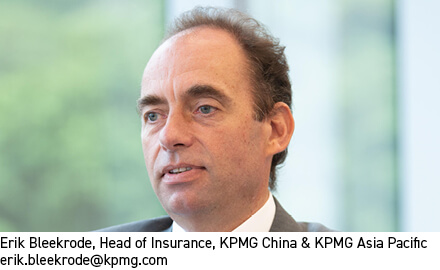KPMG: Asia’s growth prospects remain strong but insurers must get digital transformation right
May 17 2021
Erik Bleekrode
Head of Insurance, KPMG China & KPMG Asia Pacific
Despite a prolonged recovery period from Covid-19, insurance CEOs are confident about the growth prospects of their companies and are pursuing mergers & acquisitions (M&A) while accelerating their digital transformation initiatives to gain a competitive edge.
These views were shared in a KPMG survey of 50 insurance CEOs in nine key markets worldwide, as part of a broader survey of 500 CEOs across industries worldwide.[1] The survey, which was conducted in February and March this year, provides a snapshot of CEOs’ views on business growth resumption, investment drivers, and business and digital transformation priorities.
Optimistic outlook for insurers and the industry overall
The survey finds that insurance CEOs recognise that the speed at which they expect their companies to recover from the pandemic is slower than originally predicted last year. Only 32 percent of respondents believe that their companies will recover sometime in the second half of 2021, while 34 percent expect this to happen in 2022. Interestingly, the remaining one-third of insurance CEOs believe that their businesses have permanently changed and will not go back to what they were before.

According to the surveyed CEOs, the return to ‘normality’ will take a combination of a successful Covid-19 vaccine rollout, a significant drop in infection rates in key markets, and governments encouraging businesses to return to normal.
Despite their acceptance that the pandemic recovery will take longer than initially anticipated, insurance CEOs are overwhelmingly confident about the prospects for their companies (94 percent), industries (94 percent) and countries (82 percent) over the next three years. This is understandable as insurers have largely remained resilient throughout the pandemic, and the crisis has further emphasised the importance and value of insurance to society.
However, only 20 percent are confident about the prospects of the global economy, 12 percentage points lower than in a similar survey conducted last year. This could be a consequence of things taking longer to get back to normal, which in our highly connected and interdependent world is placing a prolonged burden on the global economy.
Accelerating digital transformation
When it comes to the growth of their companies, insurance leaders are heavily focused on accelerating their digital transformation initiatives, as well as pursuing M&A opportunities. In addition to the desire to increase market share, the top drivers for M&A are to on-board new digital technology to transform the customer experience, and to develop disruptive technologies that have the potential to transform their operating models. This is indicative of CEOs’ drive – as a result of the pandemic – to prioritise digital innovation, invest in technology and really change and enhance the customer experience and their value proposition.
In order to digitally transform and connect with customers in a different way, insurers are planning to invest more in customer-centric technologies, data security, digital communications and e-commerce or sales platforms. Indeed, in Asia – which relies heavily on the agency distribution model in many markets – Covid-19 has disrupted connectivity among insurers, agents and customers, and therefore a renewed investment focus on accelerating digital engagement with customers is needed.
Investment in data security is also essential as increasing digital innovation and changes to ways of working continue to give rise to new risks that insurers need to understand and manage. An investment in digital technologies should go hand-in-hand with a focus on relevant data privacy and security measures to ensure that enhancing the customer experience also involves protecting their data.
Recruiting suitable new talent and upskilling the existing workforce to excel in a digitally accelerated world is also critical in ensuring that the benefits from investments in digital initiatives and transformation are fully realised.
While KPMG professionals have seen great intent among insurance CEOs to invest in digital and operating model transformation, our view is that the sector is now at a pivot point where insurers have started to execute their investment plans, which is indicative of their optimism for their companies and industries in the coming years.
A renewed focus on ESG and sustainability
Another outcome of the pandemic has been the increasing prominence of environment, social and governance (ESG) and sustainability issues in the insurance industry. This is not just due to external expectations, but also because of intrinsic motivations among insurance companies and their leaders. There remains a continued focus on environmental and climate risk, with 90 percent of respondents looking to lock in the sustainability and climate change gains made during the crisis.
In addition, there has been a heightened focus on the ‘social’ component of ESG, with 98 percent of insurance CEOs shifting their focus to this aspect in their ESG programmes, compared to 64 percent in last year’s survey. It is encouraging to see more focus on ESG as the industry increasingly recognises the importance of the bonds created by insurers and their employees, the environment, society, and the responsibility that the industry has as a pillar of the community.
A watershed opportunity for growth
Overall, insurance CEOs’ bullishness about the growth prospects of their companies and the industry is a positive sign. While insurers need to adjust to a prolonged return to normal and the emergence of a new reality, it is clear that their clients and the community recognise the importance of insurance. It is helping to create a solid platform for insurers to grow their businesses with the right products.
This is even more evident in Asia where there is still a large insurance protection gap. This is a watershed opportunity for insurers to continue to demonstrate their value to their policyholders and the societies they operate in, which should help them drive growth and succeed. The increased investment in digitalisation can help to accelerate the provision of access to individuals in Asia who are not insured and not even part of the financial ecosystem. The ability to digitise quickly and effectively will also help insurers to increase connectivity with a wider range of customers in Asia, strengthen their resilience to business disruption, and ultimately gain a competitive edge.

The views and opinions expressed herein are those of author and do not necessarily represent the views and opinions of KPMG China or KPMG Asia Pacific.
[1] ‘KPMG 2021 CEO Outlook Pulse Survey Insurance sector’, KPMG, April 2021, https://assets.kpmg/content/dam/kpmg/xx/pdf/2021/04/ceo-outlook-pulse-survey-insurance-sector.pdf
-
QBE | Elevating customer experience, humanising claims: QBE Asia’s ‘Solutions in a Box’
Vastly improving turnaround times and personalising service delivery, QBE Asia’s award-winning, end-to-end bundled claims solutions is a game-changer for the insurance industry.
-
Beazley | What does cyber protection look like from day 1 to day 600 and beyond?
Cybersecurity is no longer just an IT concern, but a governance issue that belongs on the boardroom agenda.
-
Sedgwick | Preparing for the next storm
Insurance industry needs to recalibrate, invest in innovation and strengthen systems, talent and data practices.
-
Peak Re | From climate modelling to market opportunity: Forging a new clarity on Southeast Asia’s climate risk
Southeast Asia's protection gap: a crisis of clarity, not just capital
